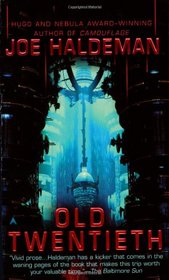Helpful Score: 2
Surprise ending. Haldeman, as always very good.
Helpful Score: 1
OLD TWENTIETH is the first book I've read by Joe Haldeman, and although I'm glad I read the book, I just can't help but be disappointed by the ending. It's hard to write a comprehensive review without giving away spoilers, but I'll try my best. That said, I gave the book 4 Stars due to the fact that it WAS an exciting sci-fi read, with a wonderful balance of scientific facts, dialogue, virtual reality, and human emotion.
The discovery of immortality led, inevitably, to the Immortality War. People who could not afford the high-priced Becker-Cendrek Process, which causes humans to become immortal, struck out against those who manufactured it, and in 2047 Earth found itself in the middle of a full-scale war. It ended with Lot 92, a biological agent that within five minutes killed off 7 billion mortal humans, leaving Earth with a much more manageable number of 200 million immortals.
In 2188, humans discovered the existence of Beta Hydrii, which was circled by at least one planet with free oxygen and water. Determined to discover if this planet, which would take at least 1,000 years to reach, could sustain a human population, a convoy of research ships takes off to check out its viability.
The main character of the book, Jacob Brewer, serves alternately as a chef on the convoy of ships and the chief engineer of the "time machine"--a full-scale virtual reality machine that can take people back into the past and immerse them in the culture of their chosen year. Inevitably, things start to go wrong during the journey to Beta Hydrii, specifically with those people who take trips in the time machine. What follows is probably the logical conclusion to such a tale, and really is an entertaining story--until the last couple of chapters.
I probably should have seen it coming. The logical series of events that leads up to the ending of OLD TWENTIETH isn't far-fetched if you've paid attention to the chapters preceding it. That said, however, I hated the ending. Like the movie(s) THE MATRIX, the beginning of the book started off with a bang; the middle was enjoyable; and the ending left me screaming in frustration.
For sci-fi fans, you'll enjoy this book. The trips back to the twentieth century via the time machine, although violent in nature and description, were truly interesting. As long as you know in advance that the ending is bound to dissapoint you, you'll be able to take the book for what it truly is--a story about human's obsession with death and technology, and how the two don't always mix.
The discovery of immortality led, inevitably, to the Immortality War. People who could not afford the high-priced Becker-Cendrek Process, which causes humans to become immortal, struck out against those who manufactured it, and in 2047 Earth found itself in the middle of a full-scale war. It ended with Lot 92, a biological agent that within five minutes killed off 7 billion mortal humans, leaving Earth with a much more manageable number of 200 million immortals.
In 2188, humans discovered the existence of Beta Hydrii, which was circled by at least one planet with free oxygen and water. Determined to discover if this planet, which would take at least 1,000 years to reach, could sustain a human population, a convoy of research ships takes off to check out its viability.
The main character of the book, Jacob Brewer, serves alternately as a chef on the convoy of ships and the chief engineer of the "time machine"--a full-scale virtual reality machine that can take people back into the past and immerse them in the culture of their chosen year. Inevitably, things start to go wrong during the journey to Beta Hydrii, specifically with those people who take trips in the time machine. What follows is probably the logical conclusion to such a tale, and really is an entertaining story--until the last couple of chapters.
I probably should have seen it coming. The logical series of events that leads up to the ending of OLD TWENTIETH isn't far-fetched if you've paid attention to the chapters preceding it. That said, however, I hated the ending. Like the movie(s) THE MATRIX, the beginning of the book started off with a bang; the middle was enjoyable; and the ending left me screaming in frustration.
For sci-fi fans, you'll enjoy this book. The trips back to the twentieth century via the time machine, although violent in nature and description, were truly interesting. As long as you know in advance that the ending is bound to dissapoint you, you'll be able to take the book for what it truly is--a story about human's obsession with death and technology, and how the two don't always mix.





